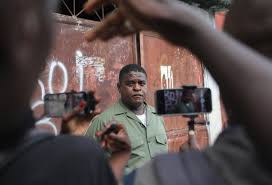In the heart of Haiti’s turbulent political landscape stands a figure both revered and feared: Jimmy Chérizier, commonly known as Barbecue. Emerging as a prominent leader amidst Haiti’s gang-driven unrest, Barbecue’s persona blends elements of a revolutionary figure with the gritty reality of organized crime. His narrative, characterized by claims of championing the impoverished and fighting against corruption, intertwines with a dark history of violence and intimidation. As the nation grapples with escalating turmoil, Barbecue’s influence looms large, raising questions about power, governance, and the future of Haiti.
Barbecue’s ascent to notoriety stems from his role as the orchestrator of an ongoing armed rebellion against the Haitian government, led by acting Prime Minister Ariel Henry. With bold demands for Henry’s resignation, Barbecue has positioned himself as a mediator of sorts, offering a temporary reprieve from the relentless violence plaguing the nation if his conditions are met. Yet, behind this veneer of diplomacy lies a complex web of motives and allegiances.
Born into the impoverished streets of Port-au-Prince, Barbecue’s journey from a struggling youth to a formidable gang leader is marred by tales of brutality and defiance. His moniker, derived from his mother’s occupation of selling grilled chicken, belies the sinister reputation he has cultivated over the years. Formerly a member of Haiti’s national police force, Barbecue’s transition from law enforcement to organized crime underscores the blurred lines between authority and corruption in Haitian society.
Central to Barbecue’s narrative is his portrayal as a champion of the downtrodden, a modern-day Robin Hood fighting against systemic oppression. However, this narrative is juxtaposed with damning accusations of involvement in heinous crimes, including massacres and human rights abuses. Despite his professed intentions, Barbecue’s methods have elicited condemnation from both domestic and international entities, culminating in sanctions and censure.

As Haiti teeters on the brink of collapse, Barbecue’s actions reverberate far beyond the confines of his gangland domain. The alliance forged between disparate criminal factions under his leadership underscores the extent of his influence, transforming him into a pivotal player in the nation’s power dynamics. Yet, amidst the chaos and bloodshed, questions linger about the true intentions driving Barbecue’s agenda.
For the Haitian populace, caught in the crossfire of political upheaval and gang warfare, the future remains uncertain. The closure of schools and hospitals, coupled with rampant violence, paints a grim picture of daily life under Barbecue’s reign. While promises of reform and elections offer a glimmer of hope, the path to stability remains fraught with obstacles.
As international pressure mounts and diplomatic efforts intensify, the fate of Haiti hangs in the balance. Whether Barbecue’s vision for the nation aligns with the aspirations of its people remains to be seen. Yet, amidst the turmoil and uncertainty, one thing remains clear: in the tumultuous landscape of Haitian politics, Barbecue stands as a formidable force, shaping the destiny of a nation teetering on the brink of collapse.
















Nice piece